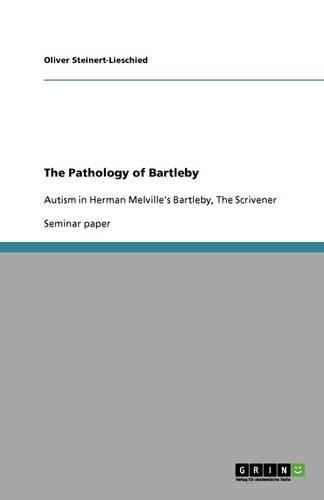Readings Newsletter
Become a Readings Member to make your shopping experience even easier.
Sign in or sign up for free!
You’re not far away from qualifying for FREE standard shipping within Australia
You’ve qualified for FREE standard shipping within Australia
The cart is loading…






This title is printed to order. This book may have been self-published. If so, we cannot guarantee the quality of the content. In the main most books will have gone through the editing process however some may not. We therefore suggest that you be aware of this before ordering this book. If in doubt check either the author or publisher’s details as we are unable to accept any returns unless they are faulty. Please contact us if you have any questions.
Seminar paper from the year 2006 in the subject American Studies - Literature, grade: 1,4, University of Goettingen, language: English, abstract: When Melville wrote Bartleby, The Scrivener , he was in a state of intense despair and a feeling of rejection had come over him because his former works such as Moby Dick and Pierre had not received the attention and appreciation he had expected. Many critics consider Melville’s failure to reach the contemporary readership to have influenced his later works such as the Piazza Tales (Dan McCall, The Silence Of Bartleby., p. 38). Some even regard the figure of Bartleby as a personification of the author (Robert Rogers, A Psychoanalytic Reading Of The Double In Literature. Detroit/Michigan: Wayne State Univ. Press, 1970, p. 67-68). Most critics agree that Bartleby is one of the most interesting characters of nineteenth century literature, also from a psychological point of view. In contrast to religious, philological or other approaches, psychoanalytic criticism is an especially anachronistic approach: Melville did not have the means of modern psychology to describe and explain such illnesses as schizophrenia, autism and similar personality disorders. Bartleby, The Scrivener is a fictional work of art while a psychological explanation of Bartleby’s illness is scientific. In psychoanalytic criticism there are three possible objects of analysis: The author (a so-called psycho-biographical approach), the fictional characters and the readership (Oxford Encycl 823). My main focus will be on the figure of Bartleby along with the narrator who is considered by some critics to be a psychological double of Bartleby and vice-versa (Rogers, Psychological Double, p. 67). Firstly, I will draw a rough summary of the transition from moral philosophy to psychology and situate Melville in that historical context and show how this influenced his worldview and accordingly, his works. Then I will make brief definitions of the mental ill
$9.00 standard shipping within Australia
FREE standard shipping within Australia for orders over $100.00
Express & International shipping calculated at checkout
This title is printed to order. This book may have been self-published. If so, we cannot guarantee the quality of the content. In the main most books will have gone through the editing process however some may not. We therefore suggest that you be aware of this before ordering this book. If in doubt check either the author or publisher’s details as we are unable to accept any returns unless they are faulty. Please contact us if you have any questions.
Seminar paper from the year 2006 in the subject American Studies - Literature, grade: 1,4, University of Goettingen, language: English, abstract: When Melville wrote Bartleby, The Scrivener , he was in a state of intense despair and a feeling of rejection had come over him because his former works such as Moby Dick and Pierre had not received the attention and appreciation he had expected. Many critics consider Melville’s failure to reach the contemporary readership to have influenced his later works such as the Piazza Tales (Dan McCall, The Silence Of Bartleby., p. 38). Some even regard the figure of Bartleby as a personification of the author (Robert Rogers, A Psychoanalytic Reading Of The Double In Literature. Detroit/Michigan: Wayne State Univ. Press, 1970, p. 67-68). Most critics agree that Bartleby is one of the most interesting characters of nineteenth century literature, also from a psychological point of view. In contrast to religious, philological or other approaches, psychoanalytic criticism is an especially anachronistic approach: Melville did not have the means of modern psychology to describe and explain such illnesses as schizophrenia, autism and similar personality disorders. Bartleby, The Scrivener is a fictional work of art while a psychological explanation of Bartleby’s illness is scientific. In psychoanalytic criticism there are three possible objects of analysis: The author (a so-called psycho-biographical approach), the fictional characters and the readership (Oxford Encycl 823). My main focus will be on the figure of Bartleby along with the narrator who is considered by some critics to be a psychological double of Bartleby and vice-versa (Rogers, Psychological Double, p. 67). Firstly, I will draw a rough summary of the transition from moral philosophy to psychology and situate Melville in that historical context and show how this influenced his worldview and accordingly, his works. Then I will make brief definitions of the mental ill